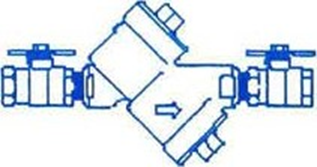Backflow is the undesirable reversal of flow of water from its intended direction in any pipeline or plumbing system. Backflow is dangerous because it can allow drinking water in plumbing systems to become contaminated and unusable, possibly even deadly.

Backflow Preventors are mechanical plumbing devices installed in a plumbing system to prevent water from flowing backward in the system. A properly installed, tested and maintained backflow preventor at the service entrance to a building or property can reliably prevent the backflow of water of an unknown quality from flowing back into the community water system.
Absolutely.
The Tennessee Division of Water Supply requires all public water systems in the state to operate an ongoing program to protect the public water supply from contamination from possible cross-connections. The most effective method for the water utility to meet this requirement is to require customers to install a backflow preventor on the main supply line to their property or facility, thus protecting the community water system from any cross-connections that may be present inside a customer’s plumbing system. All water users benefit from an active, ongoing cross-connection control program that includes the installation of backflow preventors where required by state regulations and local codes.
The backflow preventor is installed to protect the public water supply against possible hazards in the customer’s plumbing system. The actual or potential cross-connection belongs to the property owner and not to regulatory officials or the water utility. Once the water goes beyond the meter, in many cases the water quality is altered. The water utility does not want the water back, nor do the water customers want to purchase used water. If a backflow preventor is required to keep the water safe, then the person who purchased, installed and maintained the crossconnection (actual or potential) should purchase, install, and maintain the backflow preventor.
Any pipe, valve, fixture, etc., in a drinking water plumbing system that may allow the drinking water within the system to become contaminated or questionable in quality.
Cross-connections can either be eliminated or protected by an air gap or mechanical backflow preventers. Unprotected cross-connections are prohibited by state regulations, plumbing codes, and local codes. Consult your local water utility for proper methods of cross-connection control.